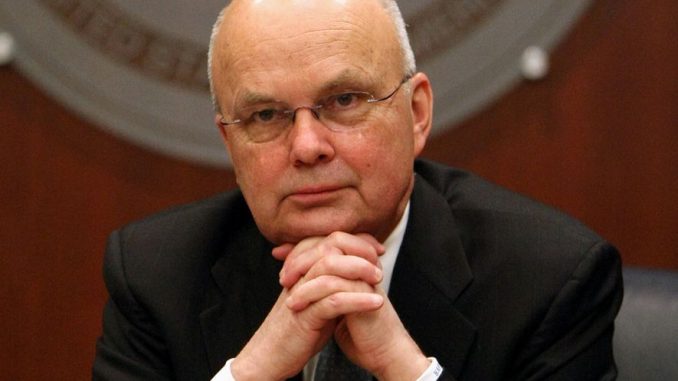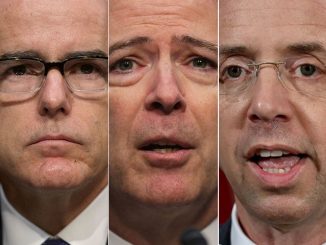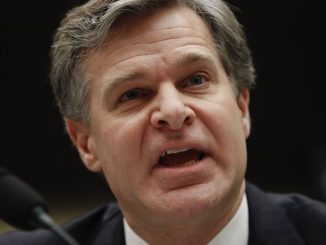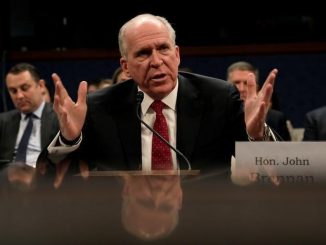
By Rowan Scarborough – The Washington Times
Stefan Halper, the college professor turned FBI spy on the Trump campaign, was paid $244,000 by the Pentagon to write a Russia-China study in 2015 and 2016.
Mr. Halper boasted a heady list of foreign policy specialists.
On Pages 7 and 8 of the 300-plus-page analysis are the names of 43 “advisors and consultants” such as former CIA Director Michael V. Hayden and David Shambaugh, a China scholar at George Washington University.
But a spot check by The Washington Times revealed that neither man contributed to nor had heard of the study, titled “The Russia-China Relationship: The Impact on the United States’ Security Interests.”
“No memory of project or person,” Mr. Hayden told The Times.
Mr. Shambaugh: “No, I was not an adviser to his study.”
Listing such esteemed individuals would convey a well-connected Pentagon contractor able to network with Washington’s establishment.
Widget not in any sidebars
Mr. Halper submitted the study to James Baker, director of the Pentagon’s secretive office of net assessment, in September 2016. That same month, he won another study contract at nearly double the money, bringing his total awards under Mr. Baker to $656,000.
This was around the time Mr. Halper served as a paid “confidential human source.”
He worked for the FBI to penetrate the Trump campaign by striking up contact with at least two national security volunteers: George Papadopoulos and Carter Page. Mr. Halper’s mission was to find out whether they played a role in Russian interference in the U.S. presidential election.
Mr. Halper’s Russia-China report, Page 7, is headed, “Consultants and Advisors. The following consultants and advisors contributed to the analysis within this study.”
Widget not in any sidebars
The list comprises two pages in alphabetical order. It is an impressive collection of college professors and former ambassadors, White House national security staffers and people inside the intelligence community.
As a representative sample, The Times contacted 15 of the 43 listed consultants and advisers. Ten replied via email:
⦁ Mr. Hayden, retired Air Force general, CIA director and National Security Agency chief: “No memory of project or person. Quick search of calendar and email shows nothing. I was at Cambridge in Nov 2009 as a guest of Richard Dearlove. For three or four days. I guess I could have met Harper then. I could’ve met with him there or elsewhere but do not have any memory of it. Clearly not an intense interaction in any case.”
⦁ Jonathan Haslam, Princeton professor and noted scholar on the history of the Soviet Union: “I was never asked to participate in this study and I would not have agreed to do so anyway. I find it troubling that I am listed in a study that I never participated in. And that some kind of payment may have been allocated to my name that I never received. I was asked to participate in a study of Russia and Afghanistan, probably back in 2013/14, but Stef failed to agree to the remuneration I wished for, so I dropped out. The pay was far too low for my expertise. I knew from working in DC in the mid-eighties how much specialist academic researchers for Andrew Marshall at the OSD usually got.’
⦁ Robert Goldberg, an analyst at The Scowcroft Group: “I do not recall being a source for Halper on his China-Russia study.”
⦁ David Shambaugh, political science professor and director of the China Policy Program at George Washington University: “No, I was not an advisor to his study. Have never communicated with him in my life.”
⦁ Lee Edwards, a political biographer and historian based at The Heritage Foundation: “I have no recollection of the study which is outside my area at Heritage.”
⦁ Michael Pettis, a finance professor at Peking University in Beijing: “‘Consult’ is a very strong word for my contribution. Halper is generous to include me at the same level as the rest of the group. I submitted a chapter to a book related to a DoD project he was running called ‘China 2030’ … and he may have used that chapter to help him understand China’s economic prospects. Aside from that, I can’t say I otherwise contributed to ‘The Russia-China relationship’ project, and in fact, until this email, was not even aware of it.”
⦁ Hans van de Ven, a professor at Cambridge University, where Mr. Halper has taught: “I know Stefan and I have had lunch with him several times here in Cambridge. But I don’t recall this report. Of course, advisor is a very broad category.”
⦁ Gilbert Rozman, professor emeritus at Princeton and editor of an Indo-Pacific journal: “I met with the author and shared my views.”
⦁ Richard N. Haass, president of the Council on Foreign Relations: A spokesman said, “He remembers meeting with Mr. Halper in 2016 and having a conversation with him, but does not recall and has no record of officially advising him on the Russia-China relationship.”
⦁ Leslie Gelb, president emeritus of the Council on Foreign Relations: A spokesman said he doesn’t recall whether he contributed or not.
Former Federal Reserve Chairman Alan Greenspan is also on Mr. Halper’s roll.
‘Defending fraud and waste’
The Washington Times presented its general findings to the Defense Department.
A spokeswoman defended Mr. Halper’s work.
“Mr. Halper’s contract with ONA required him to commission, edit and synthesize works on a specific set of topics,” said Heather Babb. “He met these requirements by working with eight individual authors. The observations and analysis in the study met our expectations.”
The Times asked whether it is acceptable to list consultants who said they didn’t contribute to a study.
“It is never acceptable for a contractor to knowingly include wrong or misleading data in a study,” Ms. Babb said.
The Times sent messages to Mr. Halper’s Cambridge University and personal addresses and received no reply. His listed phone number is not working.
Mr. Halper’s Russia-China study, a copy of which was obtained by The Times, reads like a basic academic exercise. It quotes publicly available think tank reports, such as from the Brookings Institution as well as journals including The Diplomat.
Since 2012, Mr. Halper has received more than $1 million for four studies: two for Andrew Marshall, director of the office of net assessment, and two for Mr. Baker, who took over the office in May 2015. Mr. Halper won the Russia-China contract the following May.
His largest payments came under Mr. Baker.
The same month that the $244,000 Russia-China contract ended, September 2016, Mr. Halper received a Pentagon award that ultimately reached $411,575, according to federal spending records.
The award was for the production of a similar study for Mr. Baker, this time 139 pages on India-China, by March 2018.
It was submitted to Mr. Baker, but this study didn’t contain a long list of “advisers and consultants.” Mr. Halper received $282,292 in September 2016 and a $129,280 option in July 2017. He also was conducting outreach to India, according to internal emails.
The $411,000 may have included other work. USAspending.gov records are not expansive.
Since the news media disclosed that Mr. Halper worked as a confidential FBI informant targeting the Trump campaign, he has remained out of sight and has not commented.
He was long aligned with traditional Republican foreign policy, but he voiced support for Hillary Clinton in 2016.
His Pentagon work has become a pivotal issue in the case of Adam Lovinger, an analyst at the office of net assessment who was suspended without pay for allegedly violating security rules.
Mr. Lovinger, a supporter of President Trump, was detailed to the White House in January 2017 to work on the National Security Council staff. He stayed only a few months.
Mr. Baker launched an investigation into Mr. Lovinger’s handling of confidential material. It ultimately led to his security clearance being stripped and his suspension without pay.
Mr. Lovinger denies all charges and is awaiting an appeals hearing before an administrative judge.
Sean Bigley, Mr. Lovinger’s attorney, says his client is the victim of retaliation directly tied to his complaints about Mr. Halper.
In September 2016, Mr. Lovinger sent an email to Mr. Baker complaining of contractor studies that garner big bucks but resemble academic works and are hardly read.
“Some of our contractors distribute to others their ONA work for personal and professional self-promotion,” Mr. Lovinger wrote. “Another part is the growing narrative that ONA’s most high-profile contractors are known for getting paid a lot to do rather peripheral work.
“On the issue of pay, our contractors boast about how much they get paid from ONA. Such boasting, of course, generates jealousy among those outside the club, and particularly from those who have tried to secure ONA contracts unsuccessfully.”
He added: “On the issue of quality, more than once I have heard our contractor studies labeled ‘derivative,’ ‘college-level,’ and based heavily on secondary sources. One of our contractor studies was literally cut and pasted from a World Bank report.”
Told that the Pentagon defended Mr. Halper’s report sourcing, Mr. Bigley said, “Taxpayers should be outraged that DoD spends more time defending fraud and waste and retaliating against Mr. Lovinger than they do fixing their culture of contracting excesses and whistleblower retaliation.”
Judicial Watch, a conservative watchdog group, filed a motion in U.S. District Court last month accusing the Pentagon of illegally ignoring an open documents lawsuit filed in May. The lawsuit asks the judge to order the Defense Department to search for all documents relating to contracts awarded to Mr. Halper.





Be the first to comment